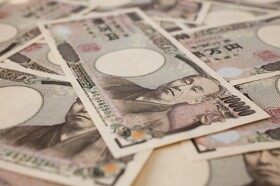The Japanese yen is losing against multiple currency pairs to start the trading week, prompted by Tokyo unveiling a massive $1 trillion stimulus package to curb the economic fallout from COVID-19. While Japan has refused to institute a nationwide lockdown, Prime Minister Japanese yen declared a state of emergency to prevent coronavirus infections â domestic cases have topped 4,000. Can the worldâs third-largest economy come out of the public health crisis unscathed? Or will Tokyo suffer immense harm?
On Monday, the Japanese government is set to unveil a $989 billion stimulus package, delivering on the prime ministerâs recent promise of his âboldest-everâ plan. The initiative, which will be released in two phases, is equivalent to about one-fifth of the nationâs economic output.
The first part of Abeâs attempts to prevent job losses and stop bankruptcies consists of subsidies, tax payment deferrals, and property tax cuts. It will also distribute $2,750 to low-income households that have lost income because of the virus â households with children will also receive assistance. Under the plan, Tokyo will try to stockpile Avigan anti-flu drugs for two million people this fiscal year.
The second round will be announced once the coronavirus has been contained. It is unclear what these measures will be, but government documents obtained by Bloomberg suggest tactics to boost consumer spending and tourism and subsidies for provinces.
In a move that might surprise analysts, the federal government will refrain from cutting the national sales tax rate, which was hiked last fall. Akira Amari, the Liberal Democratic Partyâs tax policy chief, dismissed the proposal of reducing the consumption levy by 5%:
We have various tools to stimulate the economy and I donât think itâs appropriate to cut a foundation of social stability. Itâs extremely difficult to increase or decrease the sales tax rate.
This would have freed up to $92 billion for consumers.
Meanwhile, Prime Minister Abe announced a month-long state of emergency that will give the government the authority to encourage people to stay home and for businesses to shut down. The lockdown will not be mandatory and no penalties will be given, so enforcement will depend on respect for authority and peer pressure.
Abe told reporters:
Japan wonât, and doesnât need, to take lockdown steps like those overseas. Trains will be running and supermarkets will be open. The state of emergency will allow us to strengthen current steps to prevent an increase in infections while ensuring that economic activity is sustained as much as possible.
Japanâs coronavirus situation pales in comparison to China or the US, but a panel of health experts warn that a sudden spike could overwhelm the nationâs already fragile medical care system. Ultimately, the state wants everyone to practice safe social-distancing, which has shown to be the best preventative strategy for avoiding COVID-19.
The USD/JPY currency pair surged 0.58% to 109.14, from an opening of 108.43, at 14:23 GMT on Monday. The EUR/JPY jumped 0.65% to 117.95, from an opening of 117.20.
If you have any questions, comments, or opinions regarding the Japanese Yen, feel free to post them using the commentary form below.



Be First to Comment